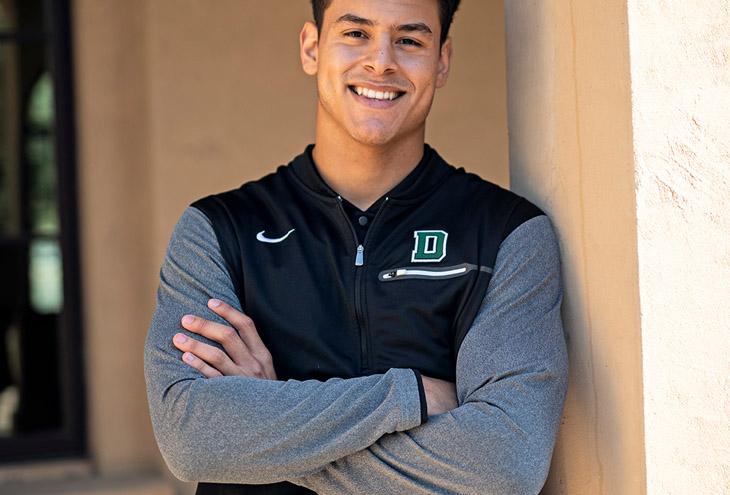As a young boy, JJ Jones III loved building. He spent hours playing with Legos and k’nex and never tired of creating something new and different. What started as a young boy’s passion has become a young man’s goal. Now in his third year at Dartmouth College in Hanover, N.H., Jones, Navajo, is majoring in mechanical engineering and minoring in Native American historical studies with plans to become a mechanical engineer, helping to keep his community — and nation — safe.
Born in Phoenix, Jones and his family moved to the suburban town of Tracy, Calif., when he was five years old. Surrounded by miles of farms and orchards, Jones found a lot to like about his new home. “My town is rather small by California standards, and many families have known each other for a few generations,” he says. “But it’s still just big enough where you have opportunities to meet plenty of new people.”
Jones also found the town to be accepting and supportive of him and his entire family, who are not the average family of four. “My brother, Jacob, was diagnosed with autism and fragile X syndrome and has been nonverbal since he was a child,” explains Jones. “My family hasn’t had your typical experience. Although my brother’s conditions made our family different, it didn’t make us any less of a family.” His brother’s conditions also served as a driving force for Jones, who became committed to making his family proud.
Jones threw himself into his studies at the Space and Engineering Academy at Merrill F. West High School. While he initially went in thinking he wanted to be an architect, Jones soon found himself drawn to civil engineering and then, ultimately, to mechanical engineering. “I’ve really liked the CAD (computer-aided design) side of engineering and the use of 3D design software,” he says. “This software has combined my love for drawing and building. I can get lost for hours designing and assembling parts in the program because of how much fun it is to see an assembled device come from a blank document.
If such a rigorous course load wasn’t enough, Jones was also a member of the high school football and baseball teams. Learning to juggle AP classes, practices, and games led to many late nights, early mornings, and days without much sleep. “Sometimes I had to sacrifice going to social events because of the time required for school and sports,” says Jones. “Some of the most difficult times were having multiple games a week, getting home, scarfing down food, then starting the hours of physics, calculus, history, and every other type of assignment that you can imagine.”
While it wasn’t easy, Jones is thankful for his family, friends, teachers, and coaches who supported him and helped him get to the next stage in his academic career at an Ivy League school. Although being 3,000 miles away isn’t always easy, Jones mostly takes it in stride. He has enjoyed being on the football team and connecting with other Indigenous students in his classes. What he did find difficult was learning how to manage entirely on his own. “The hardest adjustment when I first got to college was actually learning to just function as an independent adult and maintaining a certain level of responsibility without a parent or teacher around,” says Jones. “Learning to set aside specific times during the day where I could ensure I would handle all my school, athletic, and personal responsibilities has been extremely valuable in managing a busy life.”
Now in his third year of a five-year mechanical engineering program, Jones has not only found his footing on his desired career path, he’s also had the opportunity to further explore his Native American roots. “Some of the most interesting courses I have found at Dartmouth were not engineering courses at all,” notes Jones. “Native American studies classes have been the most interesting, which led me to pursue a minor in that discipline.” Through these classes and his membership in AISES, Jones has found new ways to connect with his heritage, including creating relationships with other Native engineers, becoming a role model for others, and participating in more Native programming.
Thanks to his schooling, an internship at the Lawrence Livermore National Laboratory, and the careers of his family members, Jones knows where he wants to go, and what he needs to do to get there. “My ultimate career goal is to be a high-level engineer at a government facility or private business, like NASA or Lockheed Martin, developing new defense and weapons technology and systems,” he says. “My father, many uncles, and grandfathers have served various military, law enforcement, and other service careers. Through this field I would be able to play my part in preserving our country’s national security.”
Jones never loses sight of this goal, and knows that he would not have made it this far without the support of his family. “My parents have always taught me to overcome adversity and never quit because when you quit once, it makes it easier to quit the next time,” he explains. He also feels strongly about pushing himself outside his comfort zone, and encourages others to do the same, noting, “I would say the best thing is not to be scared to try something new. There is a lot of value and learning when trying something new and stepping out of your comfort zone.” Jones is in the habit of doing just that.













